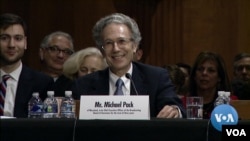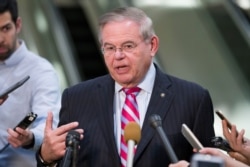The U.S. Senate Thursday approved President Donald Trump’s nominee for the U.S. Agency for Global Media (USAGM), the federal agency that oversees Voice of America and other international broadcasting entities.
On a 53-38 vote, the Republican-controlled Senate approved conservative documentary filmmaker Michael Pack to head USAGM for a three-year term. Pack’s nomination has been under consideration for two years, held up in part because of Democratic concerns about alleged financial self-dealing in his businesses.
Through his company Manifold Productions, Inc., Pack has written, directed and produced numerous documentaries, many of which have aired on PBS. He has served as CEO of the conservative Claremont Institute and held positions on the National Endowment for the Humanities and the Corporation for Public Broadcasting. He has also worked on film projects with former Trump chief strategist and co-founder of Breitbart News, Stephen Bannon.
Pack has previous experience with U.S. broadcasting, having served as director of WORLDNET, the global satellite network of the U.S. Information Agency that became the TV unit of Voice of America.
"This man is uniquely qualified to hold this position," Senate Foreign Relations Chairman James Risch said Thursday. "He's done an outstanding job - everyone should look at the most recent documentary he did on the Supreme Court - it was just outstanding. There's been a political battle fight over him for two years and one day - today is the moment of truth."
In his confirmation hearing last September, Pack addressed concerns he would attempt to impose a political bias on USAGM agencies, including VOA, which is mandated by U.S. law to be objective and balanced in its reporting.
"The whole agency rests on the belief the reporters are independent, that no political influence is telling them how to report the news and what to say. Without that trust, I think, the agency is completely undermined," Pack told the committee.
With Pack’s nomination seemingly stalled in the Senate Foreign Relations Committee, President Trump last month expressed frustration about the wait, saying it was due to Democratic obstruction. The president previously threatened to adjourn Congress to push the nomination through.
Despite reports that Pack’s business dealings were the subject of an investigation by the District of Columbia’s attorney general, the Foreign Relations Committee approved Pack’s nomination May 20, on a strict 12-10 party-line vote, and then sent it to the Senate floor for final approval.
At the time, Senator Risch said the committee was prepared to stand down on the nomination “if the United States attorney general department, Department of Justice asks to stand down; [we] will do so. That has not happened here.”
Democrats say nomination sets bad precedent
Senator Bob Menendez of New Jersey, the ranking member of the Foreign Relations Committee, said the final vote on the Pack nomination endangered the Senate’s historic advise and consent role on presidential nominees in light of the way it was pushed through without a full airing of Pack’s business dealings.
The D.C. attorney general’s office said it has opened an investigation into whether Pack unlawfully used funds from his nonprofit, Public Media Lab, to benefit himself.
“I know that the president has spoken both publicly and privately of his intense desire to confirm Mr. Pack, come what may,” Menendez said Thursday. “The objections that I have raised today and have been raising for months are not political or partisan in nature. They go to the most basic and critical question - is Michael Pack fit to serve? Should he be confirmed while he is under investigation and after having been dishonest with the Senate and the IRS?”
Menendez detailed committee Democrats’ unanswered questions, alleging that Pack had “misrepresented the relationship between his nonprofit organization and his for-profit company to the IRS.
The White House dismissed Democratic concerns, stating that, “The President stands behind Michael Pack and is disappointed, but not surprised, that Do-Nothing-Democrats have once again decided to throw political mud on a public servant’s clean record.”
Pack’s film company, Manifold Productions, Inc., received millions in grants from his non-profit, Menendez said. Yet he repeatedly told the IRS that there was no relationship between the two when in fact he ran both of them. Menendez said that Pack has yet to correct misinformation provided to the IRS and to the committee regarding the status of his tax returns.
Menendez said Pack had not provided the committee with requested documents detailing the relationship between his nonprofit and his business, claiming sensitive business information.
“Business interests are so sensitive that the United States senators cleared to review the most sensitive classified information cannot see them,” Menendez said.
VOA did not receive a response to a request for comment from Pack’s spokesperson.
US Broadcasting editorial stance
In recent weeks, Trump has criticized VOA for its news coverage of China during the coronavirus crisis. When asked about the Pack nomination on May 15th, Trump said, “Voice of America is run in a terrible manner. They’re not the Voice of America. They’re the opposite of the Voice of America.”
VOA Director Amanda Bennett defended the U.S.-funded news agency’s mission and reporting in a statement last month.
“We export the First Amendment to people around the world who have no other access to factual, truthful, believable information,” she said.
“That’s why more than 80% of our 280 million audience in 47 languages in more than 60 countries say they find our work credible,” she added.
Senator Menendez said on the Senate floor ahead of the final vote Thursday that the connection with foreign audiences depends on the agency’s protections from political interference.
“People around the world have come to view the products from all of the networks and grantees as reliable and trustworthy news sources as this pandemic has highlighted,” he said.
“It is absolutely critical that any person in this position maintain a strong firewall between the work of its networks and grantees and political interference or influence from the White House or any others."
The USAGM oversees five U.S. civilian broadcast networks, which include VOA, Radio Free Europe/Radio Liberty (RFE/RL), the Office of Cuba Broadcasting (OCB), Radio Free Asia (RFA), and the Arabic-language stations Alhurra Television and Radio Sawa of the Middle East Broadcasting Networks (MBN).





